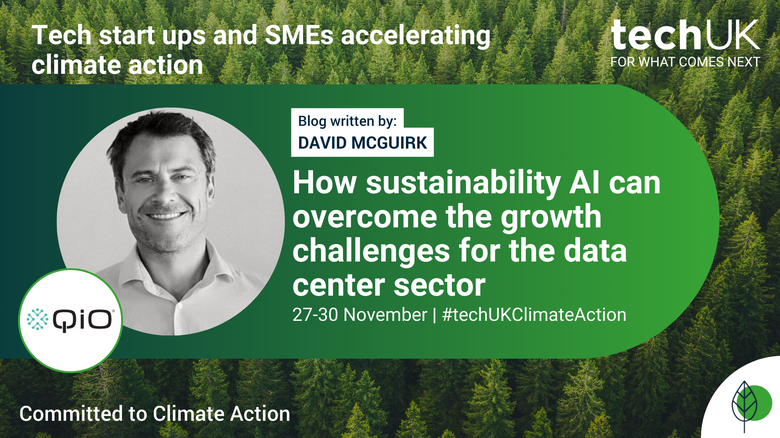How sustainability AI can overcome the growth challenges for the data center sector (Guest blog from QiO Technologies)
Guest blog by David McGuirk, Director of Data Center Telecoms at QiO Technologies. Part of techUK's Climate Action at COP28 Campaign Week 2023.

From the application of AI to the growth of m-commerce, the birth of the metaverse to burgeoning Internet of Things, the way we run our lives and businesses today is set to drive a data explosion and sustained demand for data centers.
Analysis by real estate advisors Savills, suggests that by 2025 the number of data centers in Europe alone will need to increase 2.5 times to 3,000 to meet future demand. This is in addition to the smaller but significant on-premise facilities required by industrial, finance, media and telecoms businesses – to name just a few data-hungry sectors.
As the data economy grows, the nature of demand will also change: blockchain, hyperscale cloud, AI and high performance computing all come with their own specific requirements for delivering higher performance while managing demand. This means the high growth will continue and data centres will have to support higher and higher density racks. For example, one data center giant has launched a high-density colocation service in 28 markets, which will support workloads of up to 70 kilowatts per rack.
Sustainable growth
As the sector scales up to meet this demand over the coming years the extent to which can do so sustainability will represent a major constraint on growth.
Data centers already contribute a significant proportion of greenhouse gas emissions: currently estimated at 2% globally.
International commitments to the Paris Climate Agreement demand a halt in the growth in these emissions by 2025 and then a reduction of 25% by 2030. At the same time, new sustainability reporting standards such as the EU’s Corporate Sustainability Reporting Directive requires exacting transparency and measurement of environmental impact and resource use.
In recent years, the sector can point to concrete action and innovation in meeting sustainability challenges through location choice, facility design and efforts to better manage cooling.
Now, as the scope for further optimisation of buildings has got to the point of minimal gains – as evidenced by the marginal decrease in PUE in recent years – the sector must look elsewhere to achieve the operational efficiency which will deliver the sustainability improvements required in the new operating environment.
Performance management
This will require a focus on managing IT equipment and facilities in a more nuanced way, leaving PUE behind as a measurement and looking in greater detail at performance.
This is precisely what is envisaged by CSRD which requires reporting on nine areas of resource use and equipment of IT equipment.
Of these, two metrics - IT Equipment Energy Efficiency for servers (ITEEsv) and IT Equipment Utilization for servers (ITEUsv) – will both be key to future gains in efficiency and sustainability.
A critical future task for any operator will therefore be the ability to measure and improve these key metrics from the IT stack. Relying on the simple crude metric of PUE will not be enough.
The future focus for sustainability
Learning how to optimise data centers for effiency and sustainability rather than just performance is not a straightforward task.
Interrogating vast amounts data to predict, test and measure performance in different use cases scenario is beyond the current capability of data center operators. This is down to a combination of factors: the sheer amount of working hours required to interrogate performance data and the currently siloed working arrangements for IT and facility teams. The lack of tools to assist with this task have also been a factor – until now.
In the same way that AI and machine learning has been deployed successfully to monitor and improve performance and security of the hyper scale cloud providers, AI tools will be key to unpicking the future performance / sustainability challenge for the data center sector.
With the growth that is predicted, it will become harder to manage higher volums of higher density compute, which will mean companies will not be able to keep up using manual processes. Centralised systems will need to be integrated, and secured in order to facilitate this, but once achieved, the power of AI will help them in a number of areas, such as:
-
Safety and security - for automated threat detection by detecting anomalies, and to secure all endpoints from cyber and physical threats.
-
Power management and distribution / uptime - new energy set-ups will enable software defined power systems to take advantage of following the moon pricing, and match actual workloads.
-
Predictive analytics - already in play in some data centres and helps companies to predict equipment failures, but also helps to prolong the life of the equipment
-
Thermal management - a walk around the site is no longer the way to manage hot spots and to optimise cooling. AI enabled systems are available to manage this autonomously, saving on energy and keeping the sites within ASHRAE recommendations.
-
Energy reduction from IT stack - with the increase in regulation, specifically in Europe, companies will have to report on IT energy efficiency and IT energy usage, and show improvements over time. It is now possible to baseline these two things across an entire estate, and optimise the estate using AI algorithms, thereby reducing energy consumption.
-
Modelling and optimisation of all equipment - This is like digital twin for buildings and HVAC – it is possible to plan the power and cooling distributions systems and model them within a piece of software. “What if” scenarios show how a change in one piece of equipment will affect the whole system of systems. Others look at performance of systems, and can help companies model the most efficient setup from an energy perspective.
Complexity unpicked
Seizing the opportunity that AI offers to solve the growth / sustainability challenge facing the data center sector will require a fundamental shift in the way facilities are managed.
If sustainability and resource efficiency is to be improved, then IT teams and facility teams who work in silos towards different priorities must more closely together towards clear shared targets.
This will require the knowledge and capability of a sustainability lead who can identify sustainability outcomes and manage cross functional teams. They will also need the experience and capability to ensure that measurement is aligned to external reporting frameworks such as CSRD and the business is incorporating wider sustainability targets such as those in the Paris Agreement into operational planning.
As a wave of sustainability AI providers emerges for the sector, there is a need for data center operators to proactively identify and evaluate new technology providers to understand how they can deliver on the sustainability requirements of each business.
For technical solutions to be implemented effectively and at low risk, there also needs to be someonelooking after cyber-security.
If there is one simple message which leadership teams must digest it is operational sustainability is now the key value driver and differentiator for the sector. To stay ahead and compete, organisation will need to transform and adopt new technologies.
techUK - Committed to Climate Action
Visit our Climate Action Hub to learn more or to register for regular updates.
By 2030, digital technology can cut global emissions by 15%. Cloud computing, 5G, AI and IoT have the potential to support dramatic reductions in carbon emissions in sectors such as transport, agriculture, and manufacturing. techUK is working to foster the right policy framework and leadership so we can all play our part. For more information on how techUK can support you, please visit our Climate Action Hub and click ‘contact us’.




